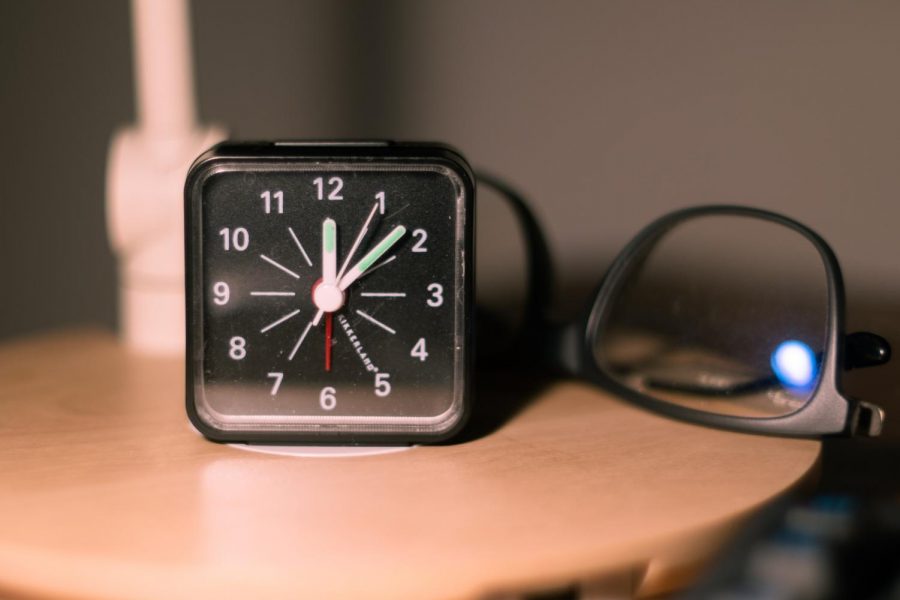Later Start Times Could Solve Student Sleep Deprivation
With the current schedule, students are not getting enough sleep to properly function.
December 15, 2021
Waking up in the morning, irritably pushing the snooze button on their phone, and dutifully rushing to school as fast as they can, is a common scene for high school students who struggle with getting enough sleep while still getting to school by the bell.
Something needs to change, and that something is school start times.
School should consistently start at 9 a.m. because sleep affects the safety and well being of all students, and should always be considered when schools decide their start times.
Being a teenager is stressful. Students do hours of homework after school, and some participate in extracurricular activities like sports, clubs, part-time jobs, or have siblings to watch. In order to fulfill all of these responsibilities, students cut into the only block of time they can: sleep.
Despite the medically necessary eight to ten hours of sleep for teens, high schoolers only get an average of six and a half to seven and a half hours of rest a night. As a result, about 73% of students are not getting the correct amount of sleep, which in turn affects their overall well-being.
A common thing I hear from adults, teachers, and parents is that teens should simply go to bed earlier, but this is simply not realistic. Teens don’t go to sleep earlier because of shifts in circadian rhythms during puberty, meaning they naturally fall asleep later than their adult counterparts, and consequently don’t get enough healthy sleep.
Based on the natural circadian rhythms of teens, ideally, teenagers would go to bed around eleven p.m. and wake up at around 9, but most wake up at around 6:30 or 7 a.m. to get ready for school.
When teens don’t have sufficient sleep, the result is drowsiness and lack of concentration.
More specifically, a lack of sleep can reduce concentration in school. Students, like myself, have a harder time listening and concentrating in class when they are exhausted.
Insufficient sleep can also result in drowsy driving because a lack of sleep affects reaction time, similar to drunk driving. Moreover, more than 6,000 fatal crashes are related to drowsy driving and students are involved in about 50% of drowsy driving accidents.
To compensate for their lack of energy, some students revert to energy drinks for caffeine in an attempt to stay awake. While it is advised that teens should only consume 100 mg of caffeine in a day, many are consuming far more than that. For instance, a 16 oz Starbucks caffe americano has 225 mg of caffeine which far exceeds the daily recommended intake for teenagers.
About 44.6% of students said they consumed caffeinated beverages one to six times a week, 11.4% said they consumed caffeine daily, while only 4.8% said they never consumed caffeine. This shows that students are using caffeine excessively due to lack of sleep.
Students shouldn’t have to fuel their bodies with processed energy to be able to drive, stay awake, and to pay attention.
If schools were to push back start times, it would improve attendance, decrease tardiness, improve grades, reduce the number of students who fall asleep in class, decrease irritability, lower caffeine dependence, and decrease the number of car crashes by an average of 16.5%.
Consistency is also key to healthy sleep schedules. The body’s circadian rhythms — or inner body clock — is guided by the time you wake up rather than the time you go to bed, meaning an irregular wake can confuse your biological clock.
While most people assume the best sleep comes from getting the most hours, regardless of when one goes to sleep and wakes up, this is actually the opposite of what doctors recommend. Both waking up and going to sleep at consistent times keeps one’s biological clock working properly and reduces fatigue.
This year, our school’s schedule is considerably inconsistent, causing many to feel exhausted on 8:30 a.m. start days.
Something needs to be done, as students cannot continue this unhealthy lifestyle and sleep cycle that affects not only their ability to work at school but their personal wellbeing.





